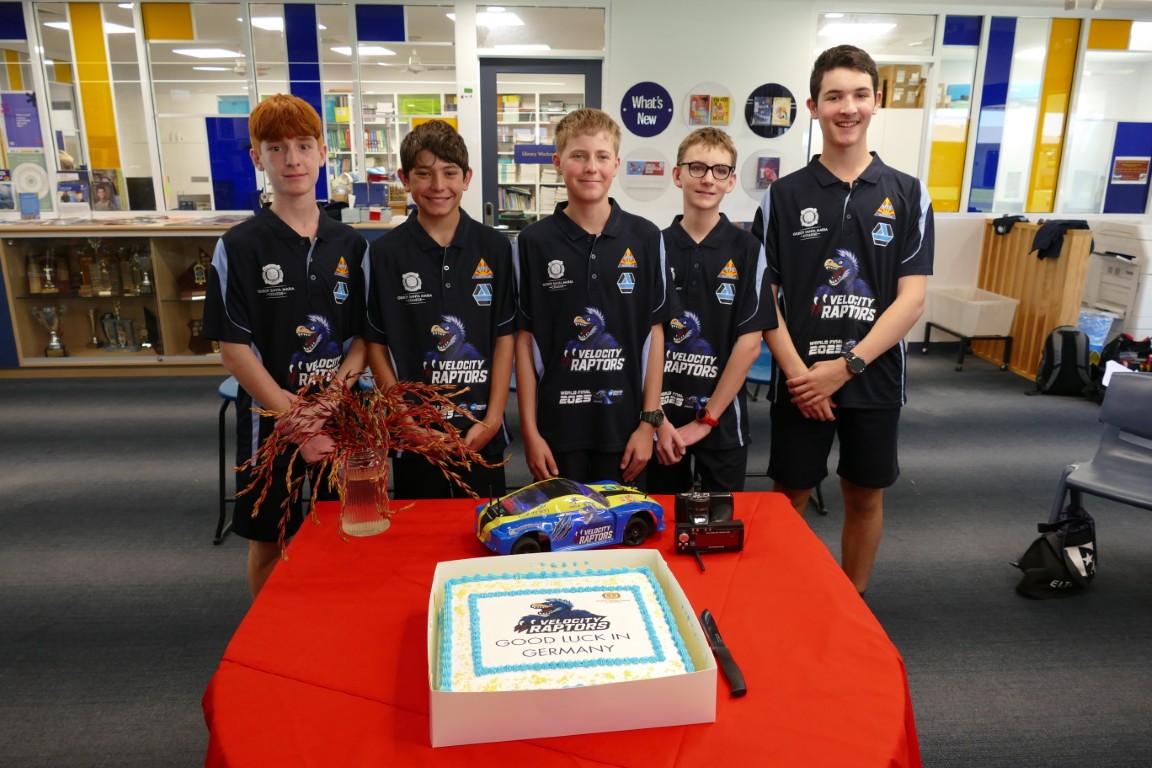
Local Students Compete In Hydrogen Grand Prix World Final In Germany Five talented students from Gilroy Santa Maria College in Ingham are trading the tropics for Germany as they compete in the Hydrogen Grand Prix (H2GP) World Final in Chemnitz. Known as the Gilroy Velocity Raptors, this Year 7–9 team earned global recognition after dominating the North Queensland Finals with a record-breaking 387 laps. In their first year—and as the youngest team competing—they’ve turned a lunchtime STEM club i
Read the full story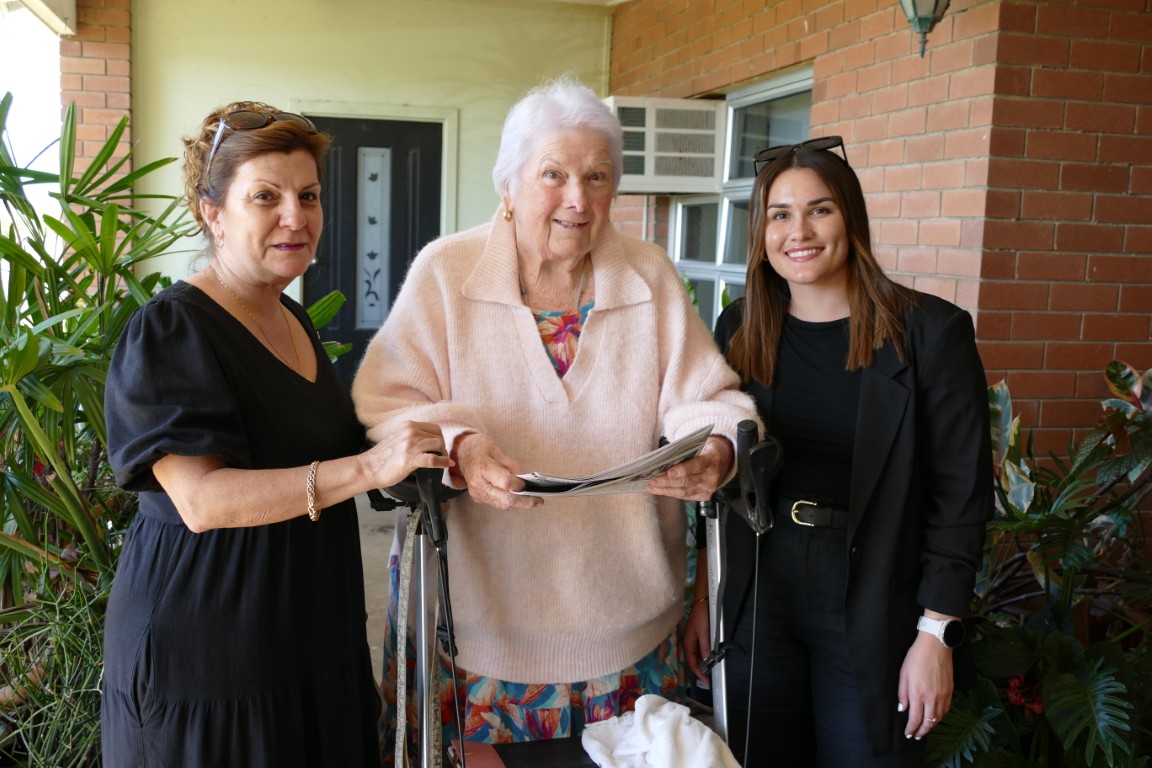
Hiya Hinchinbrookshire! The other day, I had the chance to join the Meals on Wheels delivery run with a couple of friendly faces from NAB, Jess Castellani and Teresa Nieminen. What struck me straight away was how much heart goes into something as simple as delivering a meal. It’s not just about dropping off a meal, it’s about having a quick yarn, checking in and sharing a smile. Jess put it beautifully when she said, “Meals on Wheels is more than a meal, it’s a moment of connection. Sometimes
Read the full story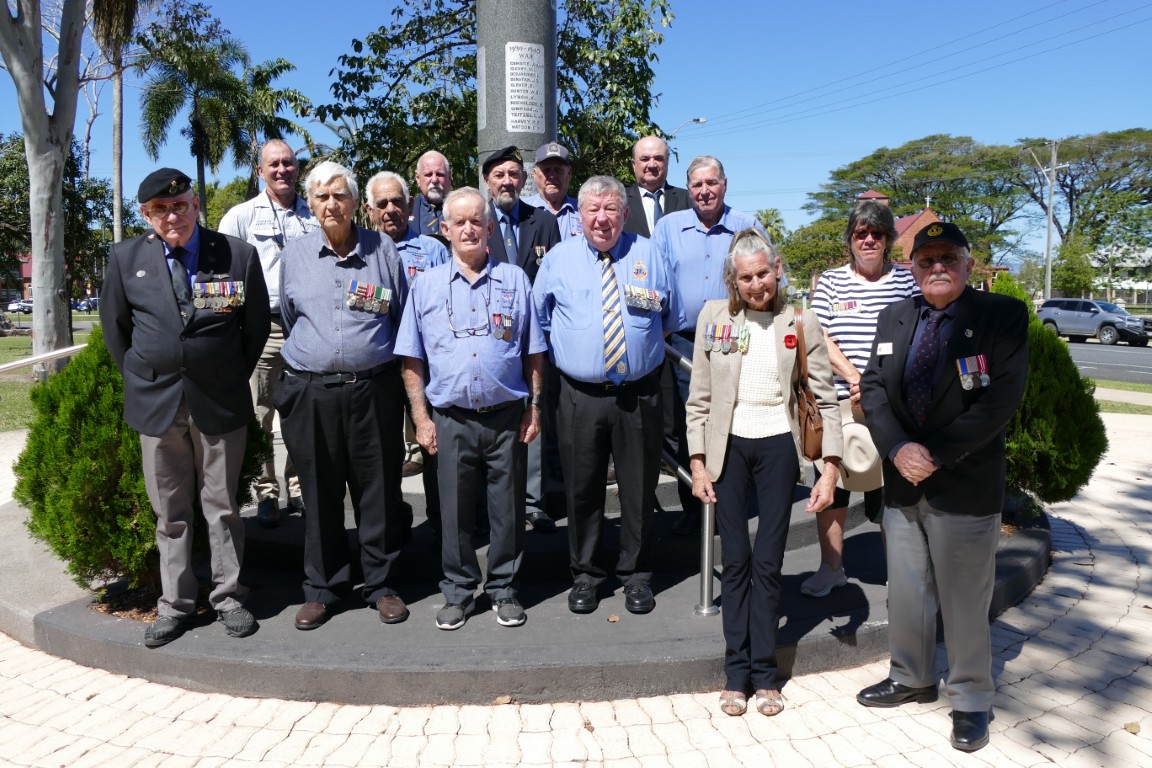
All around the Shire, and Australia, Vietnam Veterans' Day was commemorated in remembrance of the Battle of Long Tan and other Australian operations in the Vietnam War. “Vietnam Veterans Day holds profound importance in Australia's national consciousness. It is not merely a day etched into the calendar, but a moment of collective reflection, a time to pay tribute to those who served to acknowledge the complexity of their experiences and to ensure their sacrifices are never forgotten.” “The sto
Read the full story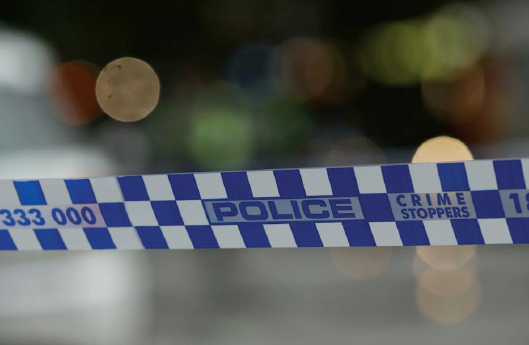
Police are continuing to appeal for public assistance to help locate dashcam footage of a silver Toyota Hilux involved in an armed robbery in Cardwell on Saturday, the 26th of July. Motorists who travelled on the Bruce Highway through Cardwell between 5pm and 6pm, or through Euramo between 5.30pm and 6.30pm, are urged to check their dashcam recordings. Anyone with relevant footage or information is encouraged to contact Policelink via the online suspicious activity form at www.police.qld.gov.a
Read the full story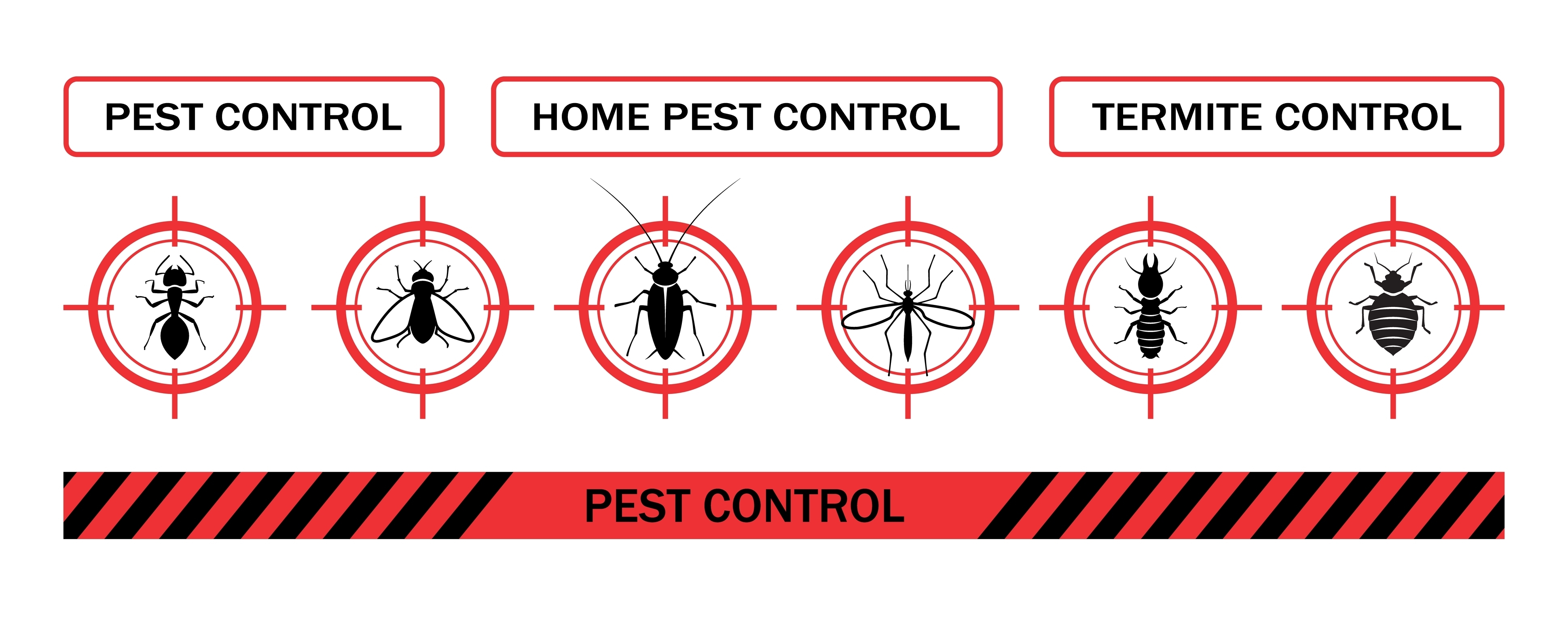
When pests invade your home or business, you want someone local, experienced, and reliable to handle the job, someone like Michael Slater. Better known around Ingham and the Hinchinbrook region as The Pest Control Guy! With over 22 years of hands-on experience in the pest control industry, Michael has built a reputation for thorough, friendly, and professional service that’s as dependable as it is effective.
Michael offers a wide range of services, including termite treatments, cockroach control, bee, wasp and bird removal, building and pest inspections, and pre-construction termite management. Whether you’re dealing with a sudden infestation or planning ahead, he brings cutting-edge techniques and top-grade products to every job. Fully licensed and insured, Michael gives his clients peace of mind while delivering tailored solutions that actually work.
Flexibility is one of Michael’s strengths. Available six days a week, he works around your schedule because pests don’t wait for convenience, and neither should you. The flood waters may have gone, but they left behind many resilient pests that thrive in damp conditions and can wreak havoc if not addressed quickly. Cockroaches, ants, and termites better beware as Michael knows exactly where to look and how to act swiftly to prevent their long-term damage to your property.
What truly sets Michael apart is his local knowledge and community-first approach. As a Hinchinbrook local, he understands the unique challenges of pest control in tropical North Queensland and is always ready to help his fellow residents protect their homes.
So, if you’ve got spiders in the shed, ants in the pantry, or termites in the timber, don’t wait. Call Michael Slater: The Pest Control Guy today on 0409 065 069 or 0439 722 311, or email appc147@gmail.com


Rural landholders across the Hinchinbrook Shire are now eligible to apply for grants of up to $10,000 to assist with clean-up and reinstatement costs following the North and Far North Tropical Low disaster event that occurred earlier this year between the 29th of January and the 28th of February.
The Rural Landholder Recovery Grant Scheme has been activated to support primary producers whose properties and livelihoods were impacted by this declared natural disaster. Funded by the Australian and Queensland Governments, this initiative aims to help landholders get back on their feet by covering direct recovery costs.
Eligible local government areas include Hinchinbrook, Cairns, Cassowary Coast, Charters Towers, Flinders, Burdekin, Palm Island, Tablelands, Townsville and Yarrabah and to qualify, landholders must meet the following criteria:
• Own or lease at least 10 hectares in one of the disaster-declared areas.
• Operate a primary production enterprise on that land.
• Hold an ABN that was active during the disaster event.
• Have earned at least $20,000 gross from primary production in the year before the disaster.
• Have no more than $250,000 gross off-farm income.
• Intend to re-establish the enterprise on the affected land.
• Not have already received financial assistance through other disaster loan or grant schemes for the same event.
The grant is reimbursable and can cover a range of expenses such as debris removal, damaged fencing, restoration of access roads, infrastructure repairs, and more. Applicants are required to provide supporting documents such as a rates notice or lease, 5–10 photos of the damage, insurance information, and evidence of expenditure.
Applications for the Rural Landholder Recovery Grant will close on the 13th of February, 2026, but eligible landholders are encouraged to apply as soon as possible to support timely recovery.
For full eligibility criteria and to apply, visit the Queensland Rural and Industry Development Authority (QRIDA) website.

Simon Hood, Wilmar Manager Grower Marketing
North Queensland has seen a nice drop in temperatures this past fortnight, which is a welcome change to our growers who are still busy out in the field preparing for the start of the 2025 season. Our team has also been active on the ground, meeting with growers to finalise their pricing and provide updates on what’s happening in the market.
For those participating in the Managed Pool Plus for the 2025 season, you would have recently received an update detailing the pool’s valuation, pricing strategy, and market outlook.
While it's still early days, the pool is tracking well above the benchmark price, supported by strong base pricing in both the futures and currency markets. The use of option strategies allows for downside protection while maintaining the opportunity to benefit from potential market rallies.
Launched last year as a new pooling option for Wilmar growers, the Managed Pool Plus has attracted strong interest from those seeking a more stable approach amid market volatility. Nominations for the 2026 season are now open and will close on 30 June. I encourage you to contact a member of the team if you’re considering this option for your pricing next season.
In broader market news, the #11 sugar contract remains range-bound due to limited activity from both buyers and sellers.
Attention is centred on Brazil’s bi-weekly UNICA reports, which offer key metrics such as harvested tonnage, CCS, and sugar mix. Yield data comes from the monthly CTC reports. The May reports indicate the Brazilian harvest is running behind schedule, with lower-than-expected yields, CCS, and sugar mix. However, it's still early in the season, and recent weather-related delays may be offset in upcoming updates.
Given the current "watch and act" sentiment, we expect prices to remain within a broad trading range of 17.00 to 18.50 USc/lb. A weaker-than-anticipated UNICA update could push prices toward the upper end of that range, while further declines in oil prices could pressure the lower end by reducing ethanol parity pricing.


Queensland’s 2025 sugarcane crush is officially underway, with harvesters firing up across the Tablelands district this morning. It marks the start of a new season that growers hope will bring better fortunes after a tough run last year.
Around 28.5 million tonnes of cane are expected to be cut and crushed across 13 districts, from Rocky Point in the south right up to Mossman in the far north.
The crop is down slightly from last year, with recent widespread flooding across north Queensland causing major losses to plant cane, while prolonged cloudy weather also slowed growth in some districts.
Despite this, growers are hoping to turn the page on 2024, which was one of the most disrupted seasons in recent memory. Unseasonal rain, mill breakdowns and industrial action caused major delays that saw some districts harvesting into January – and around a million tonnes of cane left in the paddock.
“Growers are eternal optimists,” CANEGROWERS CEO Dan Galligan said.
“They’ve done their part, growing the best crop they can under the conditions. Now we will be working together with the rest of the supply chain to make this season work.”
While last season’s industrial disputes have been resolved, the reality is, multiple difficult harvesting seasons have had a cumulative impact on the profitability of farmers, Mr Galligan said.
“In the brief break since the last harvesting season we’ve been in urgent talks with the sugar manufacturers, and while we’re seeing a real willingness to tackle the problems and get things back on track, there are no quick fixes, unfortunately.”
Workforce shortages are also creating challenges, especially in regional areas where skilled mill workers, harvester drivers and haulout crews are in short supply.
CANEGROWERS is working with local offices and the Queensland Farmers’ Federation to help address these issues.
“There’s huge potential in this industry,” Mr Galligan said.
“But we won’t fully unlock it until we can consistently harvest the entire crop in most efficient and profitable time.”
With the first cane bins filling up, growers are crossing their fingers for dry weather, reliable mills, and a smooth run through the season.


It was another great week of competition and camaraderie at the Ingham Ladies Bowls Club, with Championship and social matches played in fine spirits.
Three rounds of the Championship Pairs were played this week. G. Wright and T. Rhodes defeated M. Spano and M. Moore with a score of 23 to 18. J. Craven and N. Evans had a solid win over J. Johnson and J. Fenoglio, finishing 20 to 10. In the final match, J. Casanovas and L. Melvin overcame L. Di Bella with a score of 17 to 13.
In social play, B. Eddleston, D. Tomba, L. Di Bella, and S. Ryan won convincingly against N. Mammarella, M. Spano, J. Fenoglio, and E. Piotto, finishing 20 to 7. Meanwhile, I. Byrns, A. Foti, J. Casanovas, and J. Craven played J. Johnson, M. Moore, K. Rotondo, and A. Rutherford in a close match, ending with a score of 11.
Congratulations to all players for a fantastic week of bowls, well played!


The May Monthly Meeting of Hinchinbrook Chamber of Commerce, Industry & Tourism Inc was held last week. With the weather improving, cane season preparation commencing, visitors starting to arrive and events beginning to take place, the well-attended meeting received some exciting updates.
A presentation by special guests – representatives of Windlab provided an update on the current project the Gawara Baya windfarm. The team provided a very informative overview on the construction timelines, employment opportunities, local business and contractor involvement and potential for economic contribution to the Shire. More updates will be provided as the project planning progresses toward financial close, anticipated to be by year end.
The first “Markets at the Mosaic” for 2025 was held on 17 May, receiving overwhelmingly positive feedback from stall holders, attendees and broader community. A survey was conducted on the day, showing a staggering 35% of attendees had travelled from out of town, many confirming they had come specifically for the Markets and to enjoy the retail and hospitality experiences Hinchinbrook has to offer.
Chamber has been busy speaking to local business owners and providing information in relation to the two new Small Business Recovery Grants that have been recently announced by the Queensland Government. The Perishable Stock Loss Due to Loss of Power Grant, and the Small Business recovery Assistance Grants provide flood affected businesses with additional support toward their recovery.
A Business Recovery Clinic will be hosted at The Hinchinbrook Information and Referral Centre (73-81 Lannercost St) on Wednesday 28 May from 9am to 12pm; and will provide tailored financial and business wellbeing support and advice, as well as offering 1-on-1 sessions with small business experts. Any business owners requiring assistance are encouraged to attend this workshop.
Chamber was very proud to sponsor the inaugural Link 2 Country event last week and support local employers by showcasing local job opportunities at the event, displayed on the “job wall” during the two days.
Contributed with thanks to Hinchinbrook Chamber of Commerce President Mary Brown.


One of Hinchinbrook’s most iconic facilities is getting a facelift, with reconstruction works now underway on the ramp up to the Lucinda Jetty. Originally constructed in 1979, the Lucinda Jetty has been a vital asset to the region, and now after more than four decades of service the concrete structure that forms the ramp is being replaced to ensure it continues to serve the local sugar industry for many years to come.
The works form part of Sugar Terminals Limited’s (STL) $30 million investment in the Lucinda Jetty over the next 5 years. STL’s Assets and Engineering Manager, Richard Hughes said “This project will give the structure another 50 years of life and ensure safety for heavy vehicles accessing the offshore wharf to maintain the conveyor and the shiploader”.
STL’s terminal operator QSL Operations has engaged Townsville-based construction company CivilPlus to perform the work. Locals and visitors are advised that construction traffic will increase along Bruce Parade and that vacant Port land adjacent to the Sugar Terminal is being used for the contractor’s office and staging area. During the construction, access to the beach will be restricted, but alternate pedestrian pathways will be made available when possible.
QSL Operations Asset Services Manager, Monica Accornero said "While there may be some disruptions, we are committed to keeping the community informed and ensuring the works are completed as smoothly and safely as possible."
The project also brings positive impacts beyond the jetty itself. Workers have been brought into the Hinchinbrook region to assist with the construction, providing a boost to the local economy through accommodation, supplies, and services.
CivilPlus’s Senior Project Manager, Steve Olsen said “"We are proud that STL has trusted CivilPlus to deliver this important project, and we look forward to creating a long-lasting relationship with the sugar terminals".
The project team will provide regular updates throughout the construction works.

Queensland Minister for Primary Industries, Tony Perrett, met with cane growers near Ingham today during a visit to the Herbert River region, where many farming families were impacted by flooding earlier this year.
In town for a Community Cabinet meeting and the Link2Country Expo, the Minister also visited a local cane farm to hear directly from growers about the challenges they face and the need for fairer access to disaster support.
CANEGROWERS CEO Dan Galligan said the visit was a valuable opportunity to raise ongoing concerns around how disaster recovery rules apply to modern farming businesses.
“Many growers earn a portion of their income through ag-related contracting work like planting or harvesting, but under the current definition of ‘primary producer’, they’re often excluded from support,” Mr Galligan said.
He said this issue became especially clear following the summer flooding, which disrupted farming operations across several cane-growing districts, including Herbert River.
“Growers doing it tough need support that reflects the reality of how they run their businesses today,” Mr Galligan said. “It’s not just about one season – it’s about making the system fairer and more effective going forward.”
CANEGROWERS, in partnership with the Queensland Farmers’ Federation, continues to advocate for a broader, more realistic definition under the Disaster Recovery Funding Arrangements (DRFA).
“We appreciate Minister Perrett taking the time to speak with growers on the ground,” Mr Galligan said. “We’ll keep working with both state and federal governments to make sure no grower is left out when disaster strikes."


Tucked away in the rural town of Trebonne is one of Australia’s rarest sporting landmarks — a Pelota Mano (Basque handball) court. Built by Spanish and Basque migrants in the late 1950s, this unique site is a must-see for history and culture lovers.
Pelota Mano, a fast-paced traditional game played by hitting a ball against a wall with the hand, was once a popular pastime in the area. Today, the court stands as a fascinating reminder of Hinchinbrook’s multicultural roots.
Visitors can view the court and imagine the energy of a match once cheered on by the local community. It’s a hidden gem that offers a surprising twist to your journey through the Hinchinbrook region.

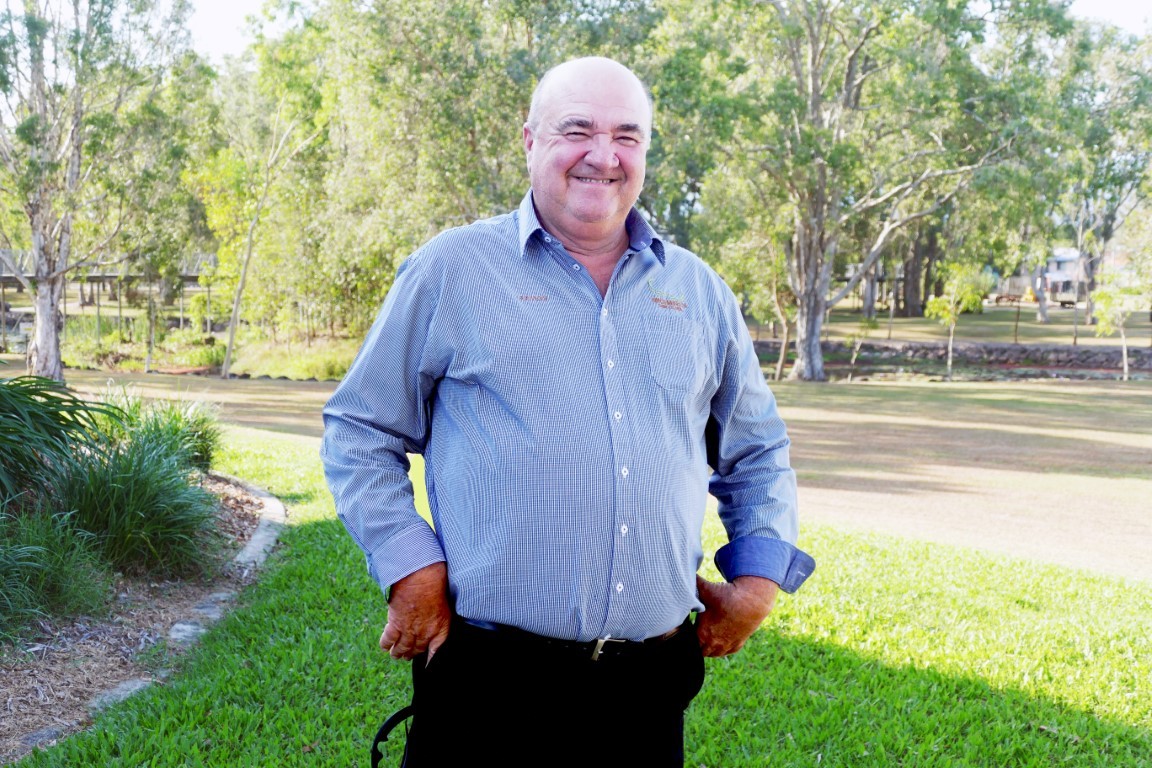
Link2Country Expo and Find Your Future in Hinchinbrook
What a massive weekend just gone. Many events were hosted and there definitely was something for people of all ages to participate in and enjoy. The inaugural Link2Country Expo at the Ingham Showgrounds was brilliant with trade displays, machinery, markets and entertainment galore. Friday was exceptional for the students of our district, with great interest in the Find Your Future programs, and interaction with the many tradies and other business people on site willing to share their knowledge on career and employment opportunities and pathways right here in our district for our future development. Congratulations to Nicole Chiesa and her team for putting on such an inspiring exposition of our district. Well done girls.
Weekend Activities
The beaches and water ways of our district were also very busy over the weekend with two classic fishing competitions running hot. The annual Taylors Beach Family Fishing Tournament was again an outstanding success, with around 285 competitors registered and enjoying a truly family orientated classic that saw the young ones this year show the oldies what fishing was all about. Congratulations to the Taylors Beach Progress Association on yet another fantastic event. Over in the Channel Country, the more serious Annual Hinchinbrook Catch and Release Tournament hosted by the Ingham Rod and Reel Association saw 98 competitors compete for the title of Champion Angler. This year the winning combination was Brody Lamb and Dion Darr. The two day contest saw 305 barra boated.
Congratulations to the organisers of the competitions for putting on such great events, bringing much enjoyment and opportunity of fellowship to our community.
To round the weekend off, we had Junior Rugby League at the Crushers on Saturday and Ingham Soccer Club hosting the regional competition on Friday night. Throw in the old time dancing at Stone River Hall on Saturday night, and you will see that there truly was something for everyone to enjoy.
A big thank you to the committees and organisers of all events. Without you and your drive to support our communities, things would simply not happen.
Commencement of Crushing Season
Just a reminder to all that the sugar cane season is upon us with a scheduled commencement of crushing announced for 10 June 2025. For anyone new to our district, this means increased traffic activity on our local roads with cane haul outs and harvesters travelling about getting cane from paddock to rail and cane trains crossing roads at established intersections throughout the district. Wilmar has indicated that cane train movements can be expected well before the tenth, due to logistical and training reasons, so be on the lookout for them now.


What a weekend, what an amazing showcase of local industry and talent! The Link2Country Expo was jam-packed with informative booths, sweet treats, giant agriculture equipment, trade experiences and even mock cattle auctions and just plain ol' whip-cracking fun.
So many schools turned out to see what their future could hold, and their arms - filled with goody bags - as the children tried out activities like honey-spinning and tractor pulling. Huge thank you to the organisers, sponsors, and all those who bought a ticket and enjoyed all the Expo had to offer, cant wait for next year!

The inaugural Link2Country Expo made a vibrant debut at the Ingham Showgrounds on 23 and 24 May, drawing crowds from across the Hinchinbrook region and beyond. Hosted by CANEGROWERS Herbert River in partnership with Hinchinbrook Shire Council and the Hinchinbrook Chamber of Commerce, Industry & Tourism, the two-day event proved a roaring success, shining a spotlight on agriculture, careers, and community spirit.
Festivities kicked off Friday morning, setting the tone for a weekend rich in energy, education, and inspiration. Over 500 students and general public explored hands-on agri-skills, cutting-edge technology like drones and VR.
Attendees connected directly with industry leaders offering career pathways across agriculture, trades, health, tourism, and more. The evening also held an official welcome by the Mayor of Hinchinbrook Ramon Jayo and the lovely ladies, Hannah and Nicole who organised the event, followed by live music and an open bar.
The Find Your Future in Hinchinbrook initiative, integrated into the Expo for the first time, was a standout feature that was offering job seekers live vacancies and application support. From excavator demonstrations and cattle handling to helicopter fly-ins and comedic performances from the beloved CrackUp Sisters, every corner of the showgrounds buzzed with opportunity and entertainment.
The Expo embodied the region’s commitment to building a resilient and locally supported workforce. As organisers and community groups reflect on the event’s success, it's clear that Link2Country has planted seeds of inspiration that will grow well beyond the weekend.
With strong community backing and regional participation, the future of agriculture and local industry is looking brighter than ever, see the expo in the Photo gallery here:
.JPG)
Hello Hinchinbrook,
I thought I would mention a few areas in the Infrastructure Portfolio.
Stormwater is the run-off from rain that falls on a roof or paved area like a driveway, road or footpath that flows into a stormwater drain. Council maintains a complex stormwater drainage network which includes many different types of drainage structures such as: Unlined drains (including natural waterways) and concrete lined open drains, Underground pipes and culverts, grates and other inlet or outlet structures.
A drainage easement is a portion of land that a property owner has granted to Council to enable the carriage of stormwater through to the main drainage system.
Illegal dumping of green waste and household rubbish in waterways, easements and drains increases the risk of flooding to properties and costs millions of dollars in property damage across the region.
Under the conditions attached to an easement, detailed on a current title search, a property owner must not obstruct the free flow of water along the drainage pathway.
Dumping waste, planting garden beds or building fences across the flow path are all examples of activities that can obstruct stormwater flow.
Council is also responsible for maintaining approximately 9 kilometres of footpaths (not including parks) and numerous boardwalks and off-road recreational walking tracks. Most paths are concrete however, some may be other finishes such as pavers, asphalt, timber or compacted rock such as crusher dust.
All paths are shared facilities for pedestrians and cyclists unless signed otherwise.
Council allocates an annual budget for repairing existing paths and for construction of new paths. Repairs are programmed following annual footpath inspection results however, if other issues are reported, they are treated as a priority. Footpath maintenance activities include concrete patches and repairs, paver re-laying and repairs, pressure cleaning and chewing gum removal and sweeping.
To request a service, make an enquiry or report an issue, please visit Council’s website, Make a Request page https://bit.ly/3HqpQeP.
Once again it is great to be able to pick up a copy of Hinchinbrook Life and read through what has been and what will be happening throughout our Shire. Thank you for the opportunity once again.
.JPG)

Hinchinbrook Shire Council is proud to be a Diamond Sponsor of the 2025 Link2Country Expo, an exciting new community event designed to educate, entertain and encourage the next generation. Taking place on Friday 23 May and Saturday 24 May 2025 at the Ingham Showgrounds, the Expo is a celebration of rural life, innovation and future opportunity.
This year’s event proudly features the return of Council’s flagship careers initiative, the Find Your Future in Hinchinbrook careers event, now integrated into the broader Expo format. Traditionally held at the TYTO Conference and Events Centre, this relocation to the bustling Expo site elevates the experience, bringing even greater value to students, families and local industry.
Free to attend for all students in Years 6 to 12, the program is offered across both days. Students attending with their schools on Friday can explore in groups, while those unable to attend on the school day are welcome on Saturday 24 May 2025.
Registrations are open now at https://form.jotform.com/251130623637854.
At Location 8, the Find Your Future in Hinchinbrook event will bring together representatives from sectors such as agriculture, health, tourism, trades, education and more. This year’s highlights include a Live Job Noticeboard with real time vacancies, on the spot application opportunities and career support services. Job seekers can even gain points toward Centrelink requirements simply by attending.
Across the rest of the Expo site, 19 other interactive locations will keep students engaged with full day and half day sessions featuring:
• Live cattle handling and working dog demonstrations;
• Excavator operation with Hastings Deering;
• Hands on agri-skills from fencing and plastic welding to suturing and tyre changing;
• Drone and VR technology showcasing the future of farming;
• Fire safety demonstrations with a live bushfire simulator; and
• Horse handling basics, leather stamping, beekeeping and more.
A special treat on Friday morning will be the arrival of Townsville Helicopters at Location 14, an unforgettable introduction to careers in aviation.
As a Diamond Sponsor, Hinchinbrook Shire Council is committed to fostering youth opportunity, supporting regional industry and building a stronger local workforce. The Link2Country Expo is a bold step forward in connecting our young people with the vibrant possibilities available right here in our region.
Don’t miss out on this inspiring two day event! Follow @link2country on all platforms or contact jmacpherson@hinchinbrook.qld.gov.au for more details or exhibitor enquiries.





Ingham Showgrounds will come alive this Friday and Saturday with the hosting of the Inaugural “Link 2 Country Expo", an industry event designed at showcasing the abundance of opportunity for work and career pathways that exist in rural communities such as Hinchinbrook.
You will wander through many trade stands offering great deals on matters of interest to you, such as trade tools, boating and other everyday life accessories, and take part in live demonstrations on basic matters such as how to change a tyre, right up to flying drones, as an emerging career opportunity.
The career opportunities are immense, and you will see it all clearly displayed through "Find Your Future in Hinchinbrook" that is on show at this tremendous event.
Want to learn line dancing or maybe whip cracking? Then classes are available for that too. There will be a lot of entertainment for the kids as well, including a kids pedal tractor pull event, and rides for the children’s pleasure.
And don't forget the little farmers fancy dress competition! Prizes will be awarded for the most creative "farm inspired costumes" so let’s see what you’ve got!
There is much to see and do over the two day event and on behalf of our community, I must congratulate Nicole Chiesa and her associates on pulling such a tremendous event together.
The work that has gone into the planning and preparations to make the event as socially and recreationally interactive, with plenty of business networking opportunity, is inspiring and the public looking to the future will benefit from the wares on offer throughout both days.
The expo commences 9am Friday 23 May 2025. The program for the two days is available at www.link2country.com.au and tickets may also be purchased through this website.
We truly have a lot to offer in this district and this expo will bring it all out. So, let’s hook in and support the event and showcase our work and lifestyle to the world. I look forward to seeing you there.

.jpg)
Following the weather events of February and March, support for community members impacted and looking for assistance is still available at the Hinchinbrook Information and Referral Centre at 73-81 Lannercost Street, Ingham.
Representatives from Community Recovery and Lifeline are available at the Centre Monday to Friday, with other government agency representatives having a presence there on a periodic basis. The community are encouraged to visit the Centre if they are still seeking assistance with matters such as assistance to complete Government Grant applications. This includes Support for Business, financial counselling, wellness coach, GIVIT assistance, Legal Aid, enquiries relating to rebuilding guidelines or any assistance relating to how the recovery process in the Hinchinbrook Shire can support local residents.
As the weeks are passing and the weather improves, preparation for the cane harvest, event and tourist visitation season is well underway. This increased activity in the farming, milling, sporting and hospitality sectors will assist the community in continuing the recovery journey back to the “new normal” of life post event.
Showcasing all the wonderful attractions on offer in the Shire, through several national television shows that have filmed and live broadcast from around the district, facilitates communications to the wider national audience, reminding them Hinchinbrook is ready and excited to again welcome visitors back for another year.
It is indeed encouraging to witness the return of sporting and social competitions, art and culture and the start of the major event season. These social outings provide the community with opportunities to reconnect, share experiences and enjoy more optimistic occasions with each other.
These progressions by no means suggest that the community has overcome all the challenges they have been facing during and since the weather event. However, as we navigate the pathway to full recovery, it is important to acknowledge what has been experienced, plan what can be improved and essential to have a positive vision for the future that can be worked toward achieving.
.jpg)